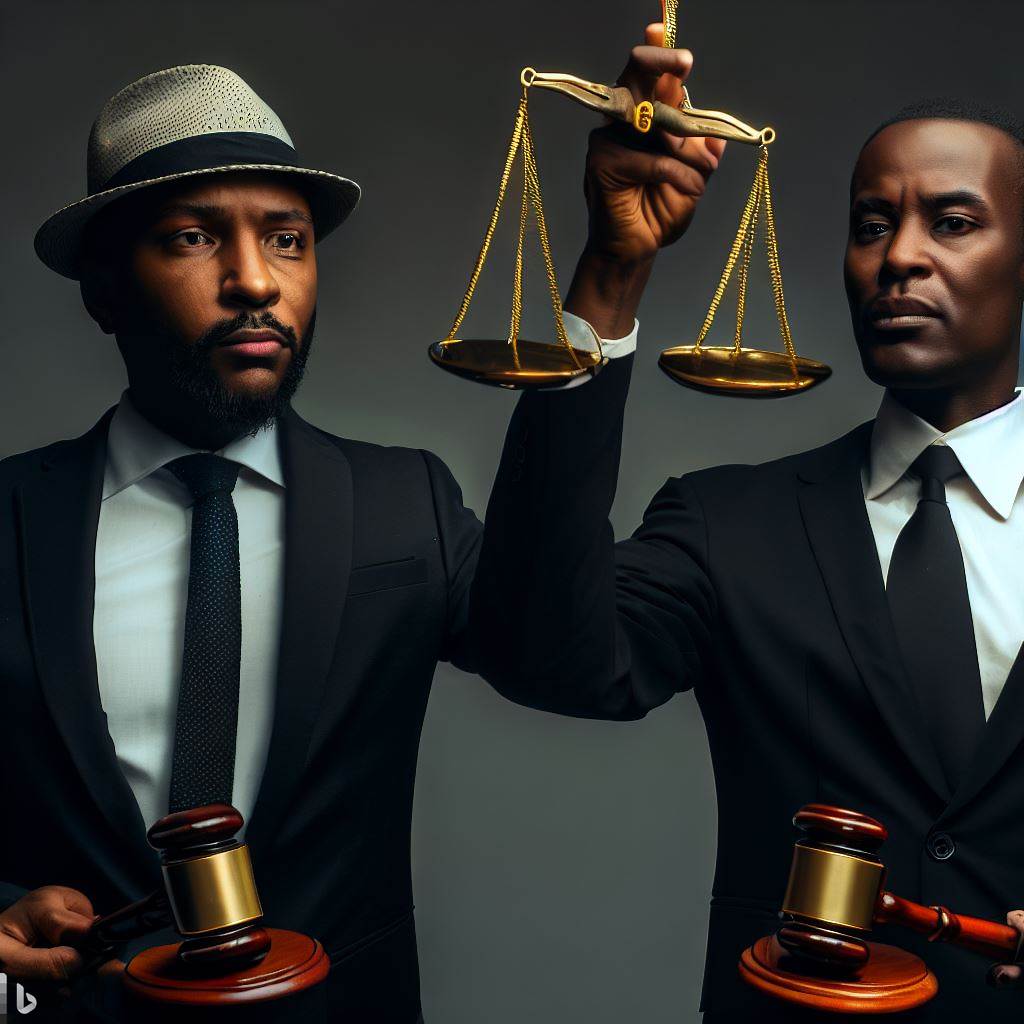Introduction to Entertainment Law
Definition and scope of entertainment law
in the Role of Entertainment Lawyers in Contracts and Negotiations, Entertainment law refers to the legal principles and regulations that govern the entertainment industry.
It encompasses a wide range of legal matters, including contracts, copyrights, trademarks, and licensing agreements.
Importance of entertainment law in various industries
Entertainment law plays a vital role in protecting the rights and interests of individuals and companies involved in the entertainment industry.
It ensures that artists, musicians, actors, filmmakers, and other professionals are legally protected and receive fair compensation.
Specific focus on contracts and negotiations in entertainment law
One crucial aspect of entertainment law is contracts and negotiations.
Entertainment lawyers are responsible for drafting, reviewing, and negotiating contracts on behalf of their clients.
These contracts cover various aspects, such as recording deals, film production agreements, licensing contracts, and endorsement deals.
In addition, entertainment lawyers also handle negotiations between different parties to ensure fair terms and conditions.
Basically, entertainment law is a complex and important field that helps protect the rights and interests of individuals and companies involved in the entertainment industry.
Contracts and negotiations, in particular, play a crucial role in ensuring fair and favorable terms for all parties involved.
Understanding contracts in the entertainment industry
Definition and purpose of contracts in entertainment
Contracts in the entertainment industry are legally binding agreements that outline the obligations between parties involved.
They serve to protect the rights and interests of artists, producers, distributors, and other stakeholders.
Common types of contracts involved in the entertainment industry
- Artist contracts: These contracts establish the rights and obligations between artists and their representatives or labels.
- Production contracts: These contracts define the terms between producers, directors, and other production team members.
- Licensing contracts: These contracts allow the rights to use intellectual property, such as music or characters, to be licensed to third parties.
Entertainment lawyers play a crucial role in navigating the complex world of contracts and negotiations.
They ensure that the interests of their clients are protected, negotiate favorable terms, and provide legal advice throughout the process.
Understanding the different types of contracts involved in entertainment is essential for both lawyers and industry professionals.
Artist contracts
Artist contracts are one of the most common agreements in the entertainment industry.
These contracts define the relationship between artists and their representatives or labels.
They cover various aspects such as the scope of work, compensation, rights to intellectual property, and termination clauses.
Negotiating favorable terms in artist contracts is crucial for ensuring artists receive fair remuneration and retain control over their creative output.
Production contracts
Production contracts are another vital component of the entertainment industry.
These contracts lay out the terms between producers, directors, and other production team members.
They address aspects like budget allocation, responsibilities, deadlines, and intellectual property rights.
Production contracts help ensure a smooth workflow and establish clear expectations among team members.
Licensing contracts
Licensing contracts allow intellectual property owners to grant rights to third parties for its use.
These contracts cover music licensing, brand licensing, and merchandising agreements.
Licensing contracts often involve negotiations regarding royalties, exclusivity, and territory restrictions.
Entertainment lawyers assist in drafting and reviewing licensing contracts to protect the intellectual property rights of their clients while maximizing revenue opportunities.
Key elements and clauses typically found in entertainment contracts
- Payment terms: Outlines the compensation structure, including advances, royalties, and percentages of revenue.
- Ownership and rights: Specifies who maintains ownership of creative works and grants rights for their use.
- Term and termination: States the duration of the contract and conditions for its early termination.
- Confidentiality and non-disclosure: Protects sensitive information shared during the contractual relationship.
- Indemnification: Determines who is responsible for legal costs and damages if disputes arise.
- Dispute resolution: Establishes the process for resolving conflicts, often through arbitration or mediation.
Understanding the key elements and clauses in entertainment contracts is crucial for successful negotiations and the protection of interests.
Payment terms outline how artists, producers, or licensors will be compensated for their work.
Ownership and rights clauses address issues like copyright ownership and licensing rights.
Term and termination clauses help avoid disputes regarding contract duration and early termination conditions.
Confidentiality and non-disclosure clauses ensure sensitive information remains protected.
Indemnification and dispute resolution clauses provide mechanisms to resolve conflicts efficiently.
In general, contracts play a vital role in the entertainment industry to safeguard the rights and interests of all parties involved.
Entertainment lawyers act as valuable allies, guiding their clients through negotiations and ensuring contracts are fair and enforceable.
A thorough understanding of contract types, key elements, and clauses is essential for both legal professionals and individuals in the entertainment industry.
Read: How to Become an Entertainment Lawyer in Nigeria
The role of entertainment lawyers in contract negotiations
Overview of the responsibilities of entertainment lawyers
- Entertainment lawyers are essential in navigating the complex world of contract negotiations.
- They provide legal advice, draft and review contracts, and represent their clients’ best interests.
- They ensure the contracts are fair, protect intellectual property rights, and minimize potential risks.
- Entertainment lawyers also negotiate terms and conditions, including payment, royalties, and distribution.
- They play a crucial role in protecting their clients’ creative work and maximizing their earnings.
Importance of legal representation in contract negotiations
- Having legal representation in contract negotiations is vital for artists and creators.
- Entertainment lawyers possess specialized knowledge and understand industry-specific issues.
- They ensure their clients are aware of their rights, obligations, and potential liabilities.
- Legal representation helps level the playing field and gives clients a stronger bargaining position.
- It reduces the risk of exploitation and helps avoid unfavorable terms or unfair contractual obligations.
Expertise and knowledge required for successful contract negotiations
- Successful contract negotiations necessitate a deep understanding of entertainment industry practices.
- Entertainment lawyers must be well-versed in contractual law, intellectual property, and business negotiations.
- They must stay updated on industry trends, changes in regulations, and legal precedents.
- Effective communication and negotiation skills are essential to reaching favorable outcomes.
- Entertainment lawyers often rely on their network and relationships to facilitate successful negotiations.
Entertainment lawyers have a significant impact on their clients’ careers and financial well-being.
They provide essential guidance, protect their clients’ interests, and ensure fair and favorable contract terms.
Without their expertise, artists and creators would be vulnerable to exploitation and legal pitfalls.
In summary, entertainment lawyers play a critical role in contract negotiations.
They possess the knowledge and skills required to navigate the complexities of the entertainment industry.
Legal representation offers protection, ensures fairness, and provides a competitive advantage for artists and creators.
Engaging the services of an experienced entertainment lawyer is a wise investment for anyone involved in the entertainment business.
Read: Entertainment Law and IP Rights: What Every Nigerian Artist Should Know

Key considerations in entertainment contract negotiations
Entertainment contract negotiations are a crucial aspect of the work done by entertainment lawyers.
These negotiations involve the discussion and agreement on the terms and conditions of contracts that govern various aspects of the entertainment industry, such as acting, music, writing, and production.
Negotiating terms and conditions
When representing clients in contract negotiations, entertainment lawyers must carefully consider several key factors.
- Compensation and royalties: One important aspect is determining the compensation and royalty structure for the client’s work, ensuring they receive fair payment for their services and artistic contributions.
- Intellectual property rights: Another critical element is negotiating the rights to the client’s intellectual property, including copyright, trademarks, and licensing agreements.
- Exclusivity and territory: Entertainment lawyers also negotiate the scope of exclusivity and territorial rights, ensuring their clients have control over how their work is distributed and where it can be exploited.
Protecting the rights and interests of clients
Entertainment lawyers play a vital role in safeguarding their clients’ rights and interests throughout contract negotiations.
- Preventing exploitation: Lawyers work diligently to draft contracts that protect clients from being taken advantage of by ensuring fair terms and preventing unfair exploitation of their work.
- Ensuring fair representation: Entertainment lawyers act as advocates for their clients, making sure they receive fair treatment, fair compensation, and are properly represented in all negotiations.
- Resolving conflicts and disputes: In the event of conflicts or disputes, entertainment lawyers employ their negotiation skills to resolve issues and mediate between parties, aiming for the most favorable outcome for their clients.
Essentially, entertainment contract negotiations involve complex discussions and agreements on terms and conditions that govern the various aspects of the entertainment industry.
Key considerations include negotiating compensation, intellectual property rights, and exclusivity.
Moreover, entertainment lawyers shoulder the responsibility of protecting their clients from exploitation, ensuring fair representation, and resolving conflicts.
Understanding these considerations is crucial for both entertainment lawyers and their clients to navigate the intricacies of this field successfully.
Read: Essential Legal Advice for Nigerian Artists and Their Managers
The benefits of hiring an entertainment lawyer
Legal advice and guidance throughout the contract process
- An entertainment lawyer provides essential legal expertise to navigate complex contracts.
- They ensure that all clauses and terms are fair and beneficial to the artist.
- Lawyers offer guidance on negotiation strategies to secure the best deal for their clients.
- They help artists understand their rights and obligations before signing any contractual agreements.
- Having a lawyer review contracts prevents potential legal disputes and protects the artist’s interests.
Maximizing opportunities and minimizing risks
- Entertainment lawyers have extensive networks and industry knowledge to identify lucrative opportunities.
- They negotiate favorable terms that maximize the artist’s potential earnings and exposure.
- Lawyers help artists avoid unfavorable contracts that may limit their creativity or financial growth.
- They assess the risks involved in different contracts and advise on how to mitigate them.
- By analyzing industry trends, lawyers can identify potential pitfalls and steer artists away from them.
Long-term protection and career management
- Entertainment lawyers provide ongoing support for an artist’s long-term career goals.
- They help in securing intellectual property rights for creative works and protecting them from infringement.
- Lawyers assist in building a strong legal foundation that facilitates growth and expansion in the industry.
- They handle contract renewal, termination, and agreement modifications to adapt to changing circumstances.
- Lawyers advocate for their clients’ rights and interests, ensuring fair treatment and preventing exploitation.
In a nutshell, hiring an entertainment lawyer offers numerous benefits for artists in the complex world of contracts and negotiations.
From legal advice and guidance to maximizing opportunities and minimizing risks, these professionals play a crucial role.
They provide long-term protection, manage careers, and ensure artists receive fair treatment and compensation.
Regardless of an artist’s level of fame or success, an entertainment lawyer is an indispensable partner in their journey to success.
Therefore, artists are highly encouraged to seek the services of a reputable entertainment lawyer to safeguard their interests and future in the industry.
Read: Protecting Creatives: Legal Rights in Nigeria’s Entertainment Industry
Case studies and examples
Highlighting famous contract disputes in the entertainment industry
- The Beatles’ dispute with their record label, Apple Corps, over the rights to their music.
- Taylor Swift’s legal battle with her former record label, Big Machine Label Group, for control of her master recordings.
- Johnny Depp’s contract dispute with the production company, The Management Group, over mismanagement of his finances.
- Prince’s fight with Warner Bros. Records to regain ownership of his music catalog.
- Beyoncé’s legal dispute with a fashion company over trademark infringement of her brand.
These case studies and examples illustrate the significant role entertainment lawyers play in the industry.
They are essential in protecting artists’ rights, negotiating favorable agreements, and resolving disputes.
By highlighting famous contract disputes, we can see the high stakes involved and the impact these conflicts can have on an artist’s career.
The Beatles’ long legal battle with Apple Corps showcased the importance of clear contractual agreements and the need for legal representation to protect artists’ interests.
Similarly, Taylor Swift’s ongoing dispute shed light on the complex and often contentious relationship between artists and record labels, emphasizing the necessity of legal expertise in navigating these conflicts.
Johnny Depp’s contract dispute highlighted the importance of proper financial management and the role lawyers play in uncovering potential mismanagement.
Prince’s legal fight to regain ownership of his music catalog demonstrated the significance of intellectual property rights and the need for legal advocacy in protecting artistic creations.
Beyoncé’s trademark infringement case showcased the breadth of issues entertainment lawyers handle, including brand protection and image rights.
These examples serve as cautionary tales and emphasize the crucial role lawyers play in safeguarding an artist’s career.
Demonstrating the impact of entertainment lawyers in resolving conflicts
- Tom Cruise’s attorney negotiating a lucrative deal for him to star in the “Mission: Impossible” franchise.
- Angelina Jolie’s lawyer helping her secure full custody of her children amidst a highly publicized divorce from Brad Pitt.
- George Clooney’s legal team successfully navigating a complex distribution contract for his production company.
- Jay-Z’s attorney assisting him in establishing his streaming service, Tidal, through strategic negotiations with major record labels.
- Martin Scorsese’s lawyer ensuring proper licensing and clearance of copyrighted material in his films.
On the other hand, the positive impact of entertainment lawyers is also evident in successful negotiations and agreements.
Tom Cruise’s attorney securing his role in the lucrative “Mission: Impossible” franchise exemplifies the financial benefits lawyers can bring to their clients.
Angelina Jolie’s lawyer played a pivotal role in safeguarding her parental rights during her high-profile divorce, ensuring a favorable outcome.
George Clooney’s legal team’s ability to navigate complex contracts showcases the importance of legal expertise in deal-making.
Jay-Z’s attorney was instrumental in establishing Tidal and facilitating partnerships with major record labels, showcasing the role lawyers play in business ventures.
Martin Scorsese’s lawyer ensured compliance with copyright laws, allowing his films to be released without legal complications.
Generally, case studies and examples of famous contract disputes and successful negotiations demonstrate both the challenges and benefits of having entertainment lawyers in the industry.
From protecting artists’ rights to resolving conflicts and securing favorable agreements, these legal professionals play a vital role in shaping the careers of artists and safeguarding their interests.
Conclusion
Recap of the role of entertainment lawyers in contracts and negotiations
Entertainment lawyers play a crucial role in the contracts and negotiations within the entertainment industry.
These legal professionals act as advisors, representatives, and protectors of their clients’ interests.
They draft and review contracts, negotiate deals, and ensure that their clients’ rights are safeguarded.
Importance of obtaining legal representation in the entertainment industry
Obtaining legal representation in the entertainment industry is of utmost importance.
Without an entertainment lawyer, individuals may unknowingly enter into unfavorable contracts.
An entertainment lawyer possesses the expertise and industry knowledge necessary to navigate the complex legal landscape.
They ensure that artists, producers, and other industry professionals receive fair compensation and protection.
Final thoughts on the significance of entertainment law for industry professionals
Entertainment law serves as the backbone of the industry, providing necessary legal guidance and protection.
Industry professionals must recognize the significance of entertainment law in their careers.
It is essential to have an experienced entertainment lawyer by their side to avoid pitfalls and maximize opportunities.
Publish Your Professional Profile, Business or Brand
Showcase your expertise, gain trust, and boost visibility instantly on Professions.ng.
Publish NowThe role of entertainment lawyers cannot be understated, as they shape the future of the entertainment industry.
Overall, the value of entertainment law in contracts and negotiations cannot be overstated.
Industry professionals must prioritize securing legal representation to ensure their success and protect their rights.




